With growing interest in indoor plants and gardens, there is also more attentiveness toward organic ways to combat the pests. Everyone is talking about organic pest control methods because of their cheaper and environment-friendly nature. Moreover, these natural pest control remedies for garden are easy to make and apply.
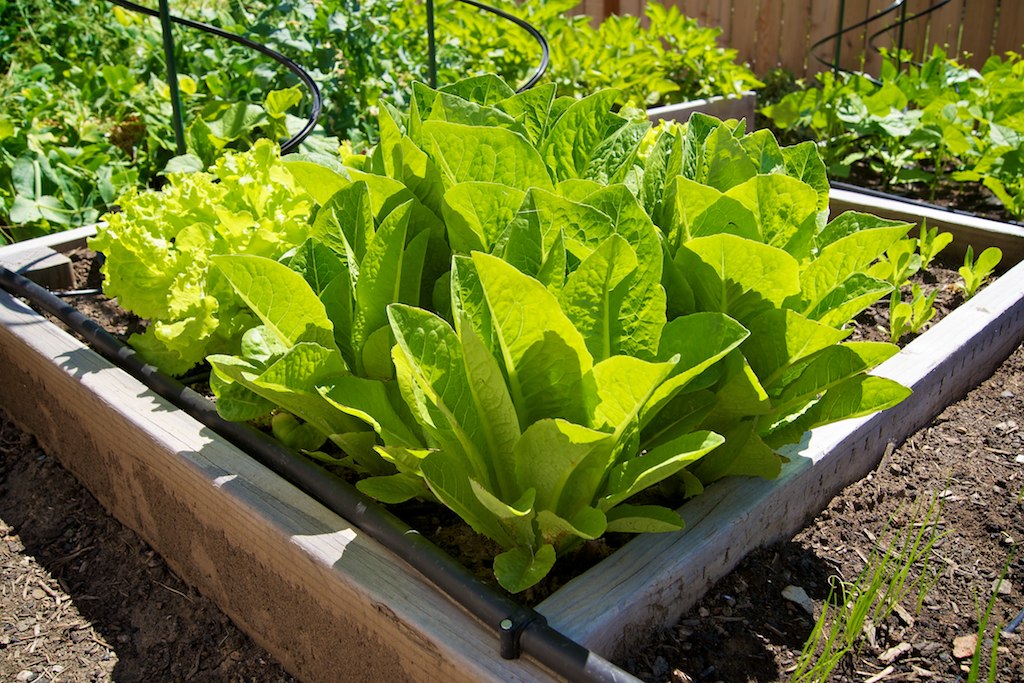
Healthy vegetable garden
Natural pest control remedies for garden pests are practical solutions to get rid of unpleasant insects and microbes. These methods vary from the introduction of beneficial insects to neem oil and liquid soap applications. Organic pest control strategies successfully keep them away with zero residual effects on the environment.
Let’s learn more about natural garden pest control methods and how to employ them on infested plants properly.
What Is Natural Garden Pest Control?
Natural garden pest control strategies are plant, animal, microbe, and insect-based products used to control pests with little to no effect on the environment. Examples of these natural remedies include neem oil, which contains azadirachtin—a killer of all kinds of problems, like nicotine, Rotenone, carboxin, and Bacillus thuringiensis (microbial pesticide).
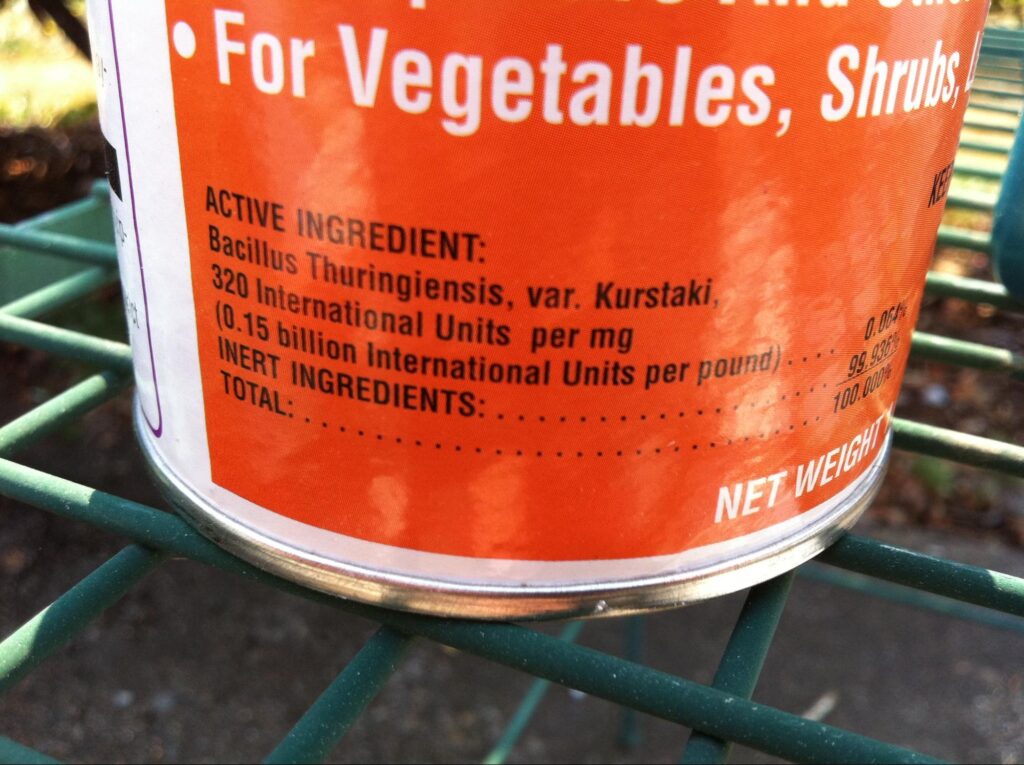
Dipel dust—a microbial-based (Bacillus thuringiensis) pesticide to kill vegetable caterpillars
Using these natural pesticides is that they break down quickly and are less damaging than synthetic chemicals. Furthermore, these natural pest control remedies also have zero threat to the ecosystem and its stability.
Types of Natural Pest Control Products
Natural pest control products come from many agents such as plants, microbes, and minerals. Here are the following types of natural products used to get rid of outdoor pests;
Botanical
These pesticides are derived from plants and effectively kill insects at all life cycle stages. Examples of botanical pesticides are pyrethrins (derived from chrysanthemums), Rotenone, Sabadilla, and neem. They can kill insects within hours and prevent vegetable gardens from their damaged.
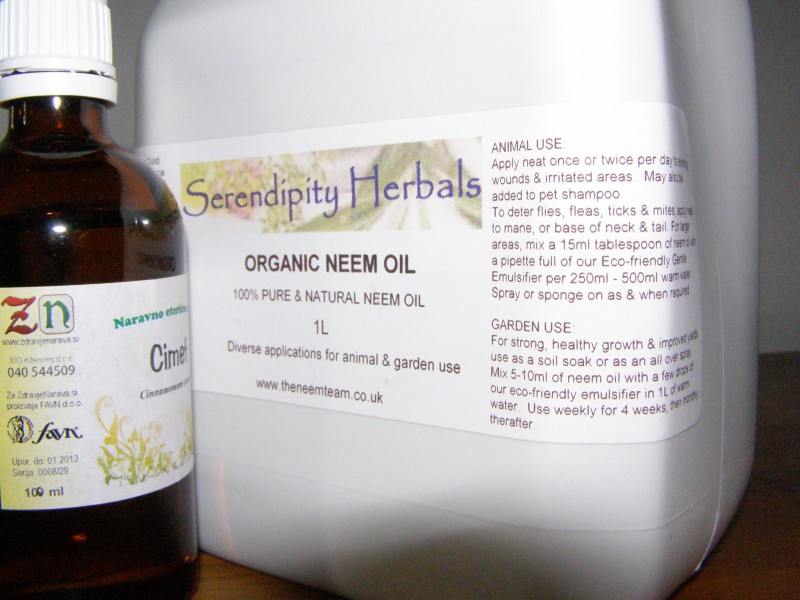
Neem oil is a triple-action agent to kill insects, fungus, and mites
Microbial
These microbe-based insecticides or pesticides are from bacteria, fungi, and algae. The mode of action of the microbial pesticide is to introduce disease to the insect population and interfere with their reproduction. They are the most effective in controlling the pest population on a larger scale.
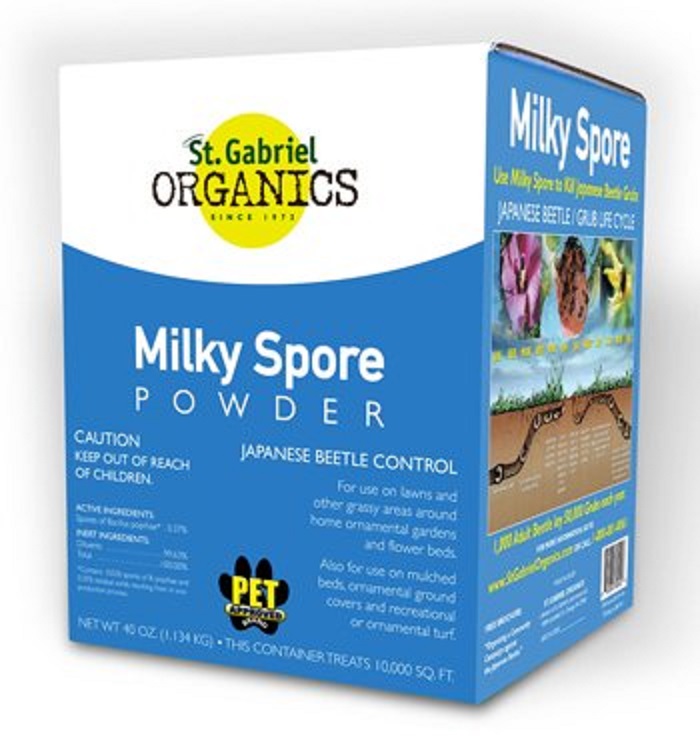
Milky spore powder to get rid of Japanese beetles’ grubs
An example of a microbial pesticide is milky spore (a disease caused by bacteria), which is effective in controlling insect populations.
Mineral
Mineral-based pesticides include sulfur and lime sulfur. They play a crucial role in managing the insect pest and improving the plant health and yield overall. Mineral products can be applied as a foliar spray and soil drench.
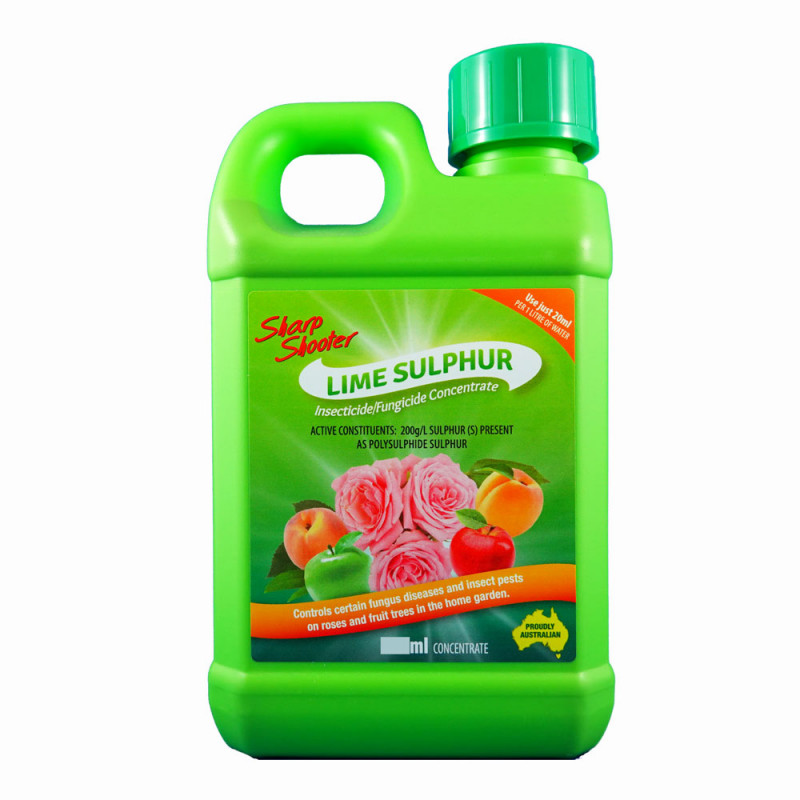
Lime sulfur solution spray to kill pests and improve plant health
Homemade Organic Pesticide
Like the minerals mentioned above and microbes, home remedies from herbs and spices are cures for all problems, either insect- or microbial pathogen-related. These home remedies and cultural practices bring good results in vegetable gardens and indoor plants.
This very own homemade bug spray can be made through garlic, onion, cinnamon, cayenne pepper, dish soap, and vegetable oil. The pungent smell of these spices repels the garden pests and stops them from coming over again.
In addition to that, sticky traps are also helpful in capturing the adult flying insects such as fungus gnats and interfering with their reproduction cycle.
RELATED: An Introduction to Flea Beetle plus How to Get Rid of this Garden Pest?
How to Prepare Homemade Insecticides?
These homemade insecticides are easy to prepare with natural products such as;
Prepare a Garlic Spray
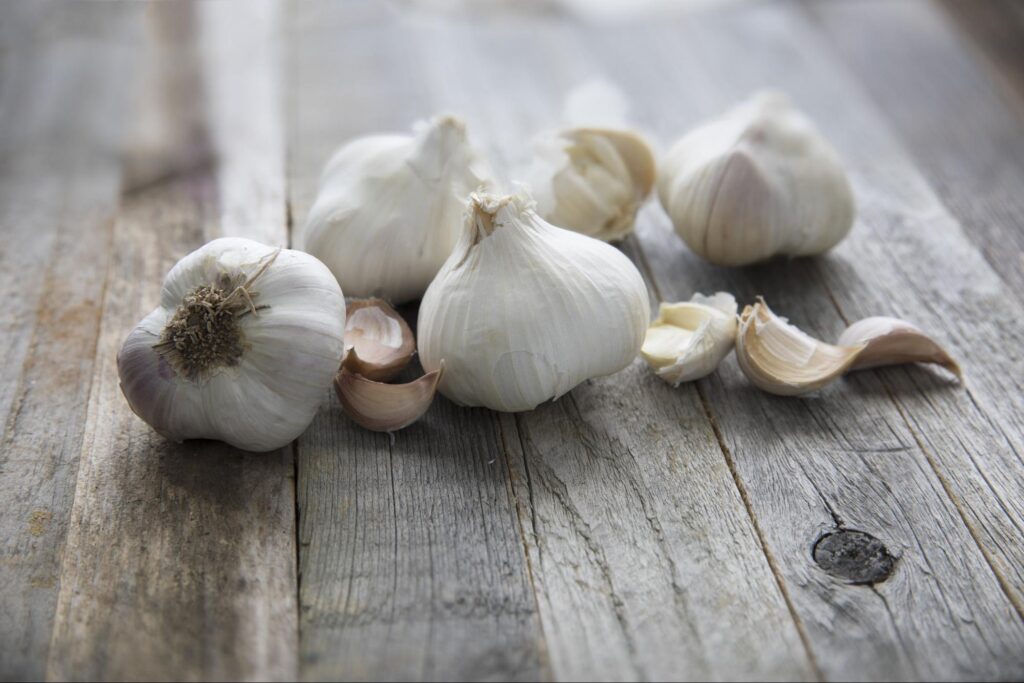
Garlic spray acts as an insect repellent and keeps the bugs away
- Take one head of garlic and peel the garlic cloves
- Take one tablespoon of liquid soap and two tablespoons of vegetable oil in a bowl
- Add two quarts of water into the bowl and let it sit overnight
- Strain the mixture and pour it into the spray bottle
- Spray the mixture on affected plants and ensure the entire plant is fully covered to repel the insect pests.
Note: Ensure the plant leaves for fully saturated with it and reapply once a week.
Prepare a Red Chilli Spray to Repel Garden Bugs
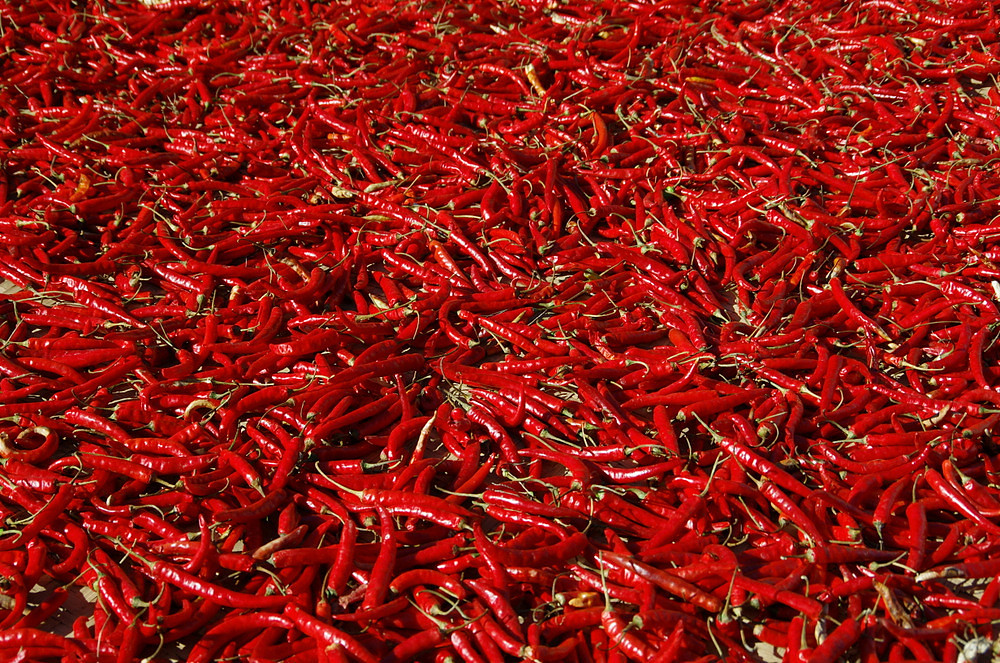
Red chili spray to bug off whiteflies, garden slugs, and snails
- Take a handful of dried hot peppers in a blender or food processor and grind it to dust.
- Wear gloves and a mask to sprinkle around the garden to repel insect pests, cats, and dogs
- For more effective results, add one quart of vegetable oil to a half cup of chili powder and mix it thoroughly.
- Spread the sticky material on both the sides (upper and lower) of the leaves
Note: You can mix red chili with water and dish soap to prepare a bug-off spray. However, take notes not to use the soap with bleach.
Homemade Tobacco Spray
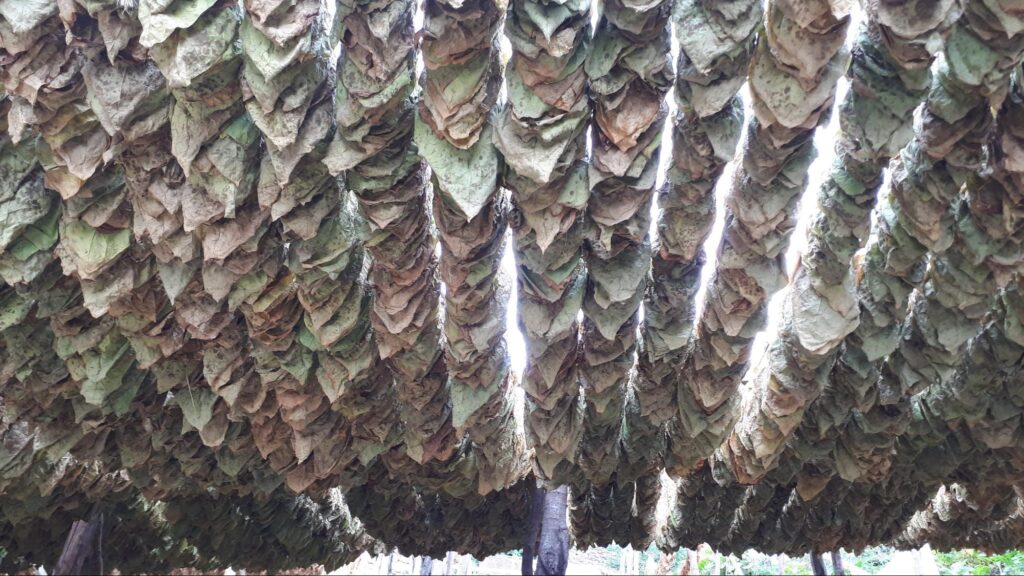
The nicotine in tobacco impairs the insect nervous system and is a win for gardeners to kill all kinds of pests.
We all know that tobacco is not suitable for human health, but it can be a gardener’s best friend in achieving the goal of a healthy garden. Because the nicotine in tobacco impairs the insect’s nervous system and kills all kinds of insect pests.
To prepare a tobacco spray;
- Take 1/4 cup of tobacco leaves in a sock and soak it in a quart of water overnight.
- Pour the tobacco water into a spray bottle and sprinkle over plants until the leaves are thoroughly wet.
Note: Do not use this spray on the plants of the nightshade family like petunias because they may get a viral infection.
Epsom Salt Spray
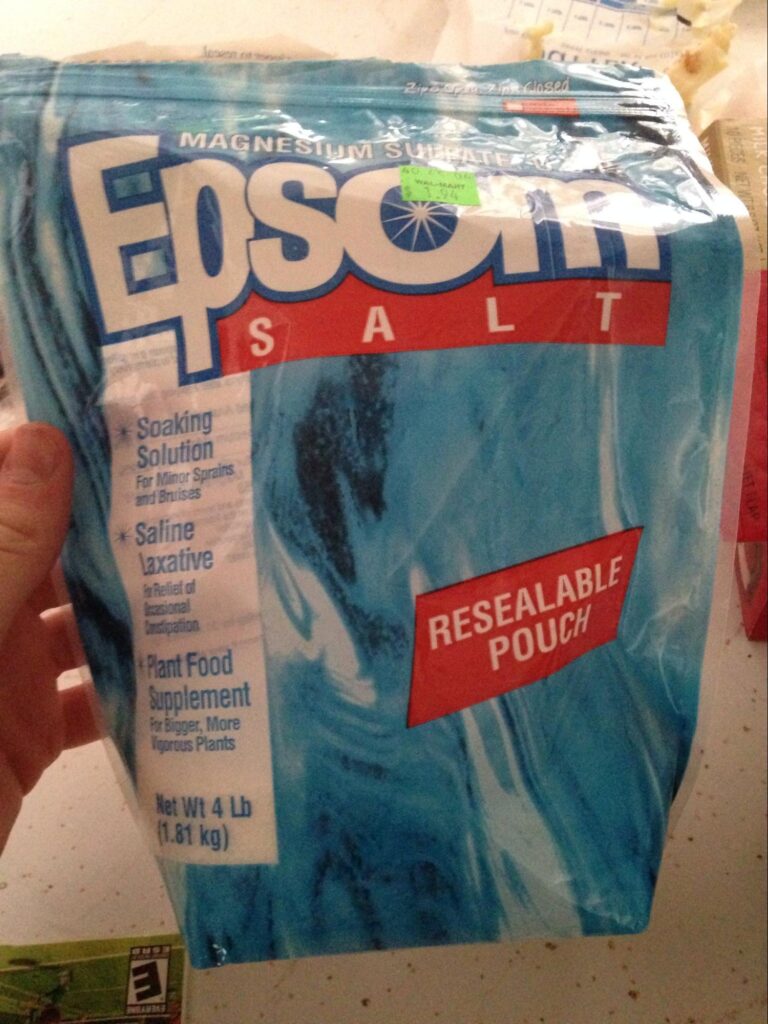
Epsom salt punctures the insect body and causes their death due to dehydration.
Epsom salt punctures and ruptures the insect body, leading to their death through dehydration. It can be applied as a soil drench or foliar spray to ward off the pests.
- Sprinkle a handful of Epsom salt near the plant base over the soil to kill slugs, beetles, and their grubs.
- Take one cup of salt into a five-gallon of water, mix it well and pour it into a spray bottle.
- Apply it on foliage to deter pests. It will also add magnesium to soil and improve nutrient absorption.
Citrus Spray
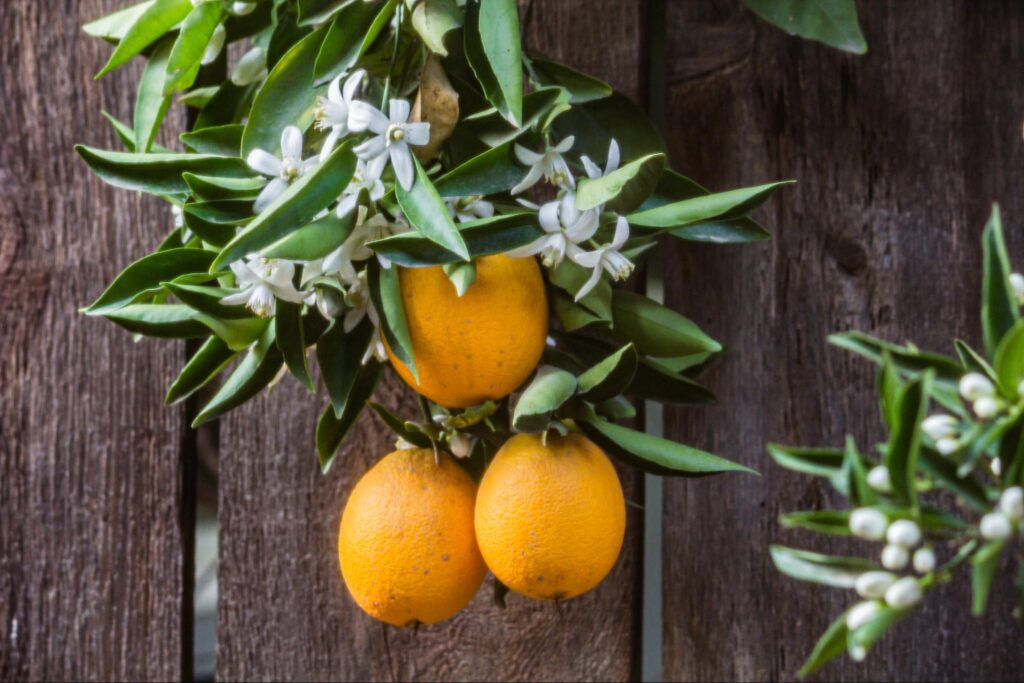
Citrus rind makes a great spray to kill soft-bodied insects.
The citrus rind has a tremendous ability to kill soft-bodied insects such as aphids, whiteflies, and mealybugs. To prepare the citrus solution;
- Remove the lemon peel and add it to the boiling water.
- Let it rest for the night.
- Strain the mixture and pour it into a spray bottle.
- Apply uniformly on the plant to deter pests on flowering plants
Vegetable Oil Spray
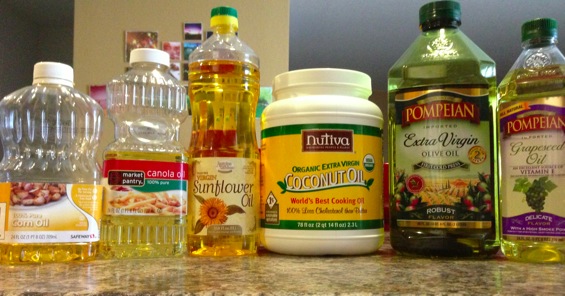
Vegetable oil sprays smoothers all kinds of insects.
A natural garden pest spray—vegetable oil suffocate and kill the adult females laying eggs on the underside of leaves, their larvae, and pupae. It is the most effective and cheap spray to kill spider mites, scale insects, mealybugs, caterpillar larvae, aphids, and whiteflies.
To prepare the essential vegetable oil spray;
- Take one cup of vegetable oil in a container and add one tablespoon of dish soap.
- Mix these two ingredients thoroughly
- Take two teaspoons of the mixture and add one-quarter of water. Mix the ingredients thoroughly and pour them into a spray bottle.
- Spray the mixture directly onto the plant surfaces to kill and repel pests.
RELATED: How to Get Rid of Whiteflies in Your Garden and Houseplants?
Rubbing Alcohol Bug Spray
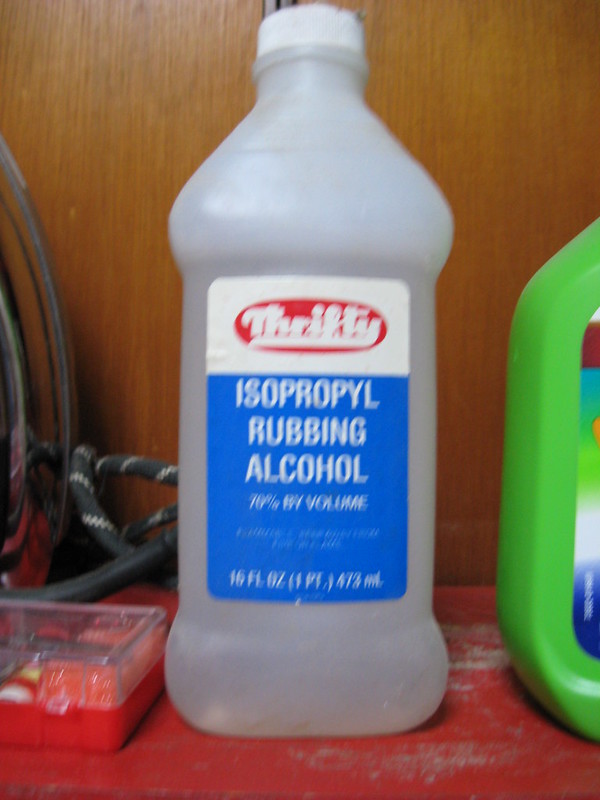
Isopropyl alcohol to wash off the pests
Rubbing alcohol spray is the quickest way to eliminate soft-bodied insects such as whiteflies, aphids, and mealybugs. Alcohol dissolves the bodies of these pests and kills them.
The best way to apply it on plant leaf surfaces is dabbing. Take a cotton swab, soak it in alcohol, and wipe it directly onto the insect body to desiccate it. Avoid contact with plant tissue because alcohol may damage the chlorophyll molecules.
Encourage Natural Predators
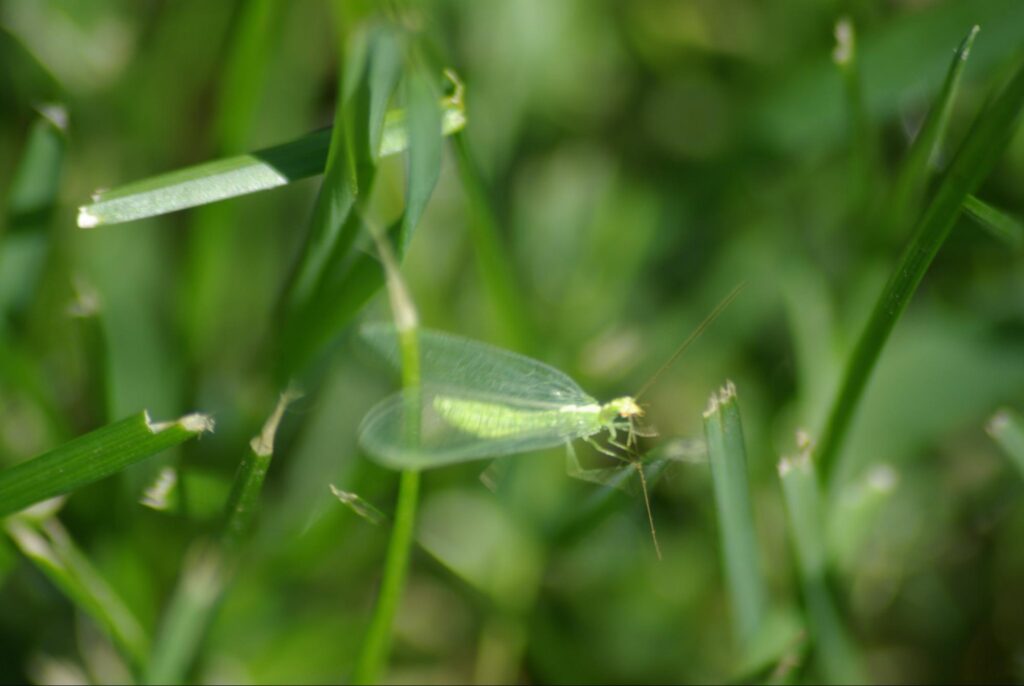
Green lacewing aggressively looking for its prey to have some dinner
The natural predators of vegetable garden bugs help control threatening insect pests—for example, predatory beetles, green lacewings, and parasitic wasps. The parasitic wasps deposit their eggs in young larvae and adults among these beneficial insects.
When these eggs hatch, the larvae of parasitic wasps feed on prey’s body fluids, thus killing them. Therefore, do not spray the vegetables with synthetic chemicals to encourage these beneficial insects in your garden.
Apply Horticultural Grade Diatomaceous Earth
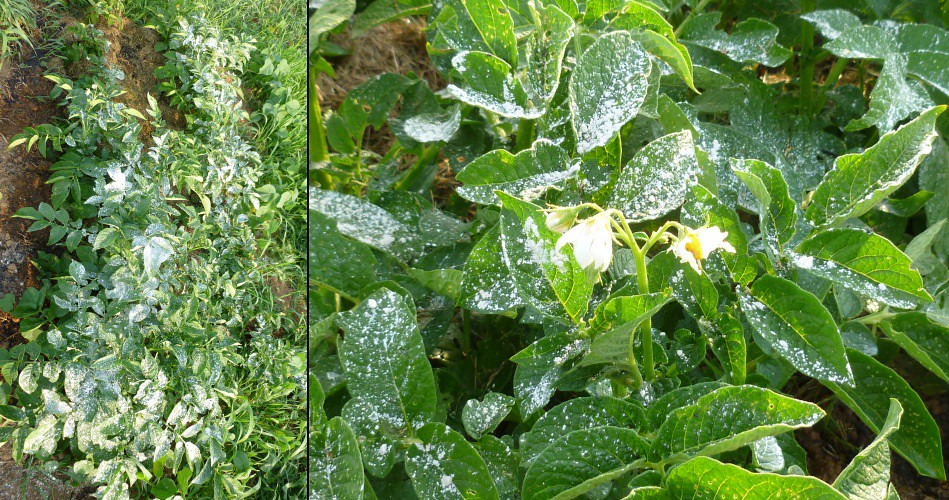
Garden potato with horticultural grade diatomaceous earth on leaf surfaces
This natural substance is derived from fossilized algae (diatoms) and is a natural insecticide for various pests. Diatomaceous earth works as an insect poisoning, puncturing, and smothering agent. It absorbs the lipids from the insect’s exoskeleton and dehydrates them.
Diatomaceous earth can be applied as a soil drench (mixing it with potting soil to kill insect eggs and larvae) and foliar spray. A simple coating of this (diatomaceous earth) fine powder on leaf surfaces will prevent the feeding injuries of pests. It is effective against the following garden pests;
- Squash bugs
- Thrips
- Leafhoppers
- Leaf miners
- Earwigs
- Ants
- Potato beetles
- Fleas
- Whiteflies
- Aphids
- Mealybugs
- Scale insects
- Slugs and snails
- Spider mites and russet mites
Tomato Leaf Juice to Kill Garden Bugs
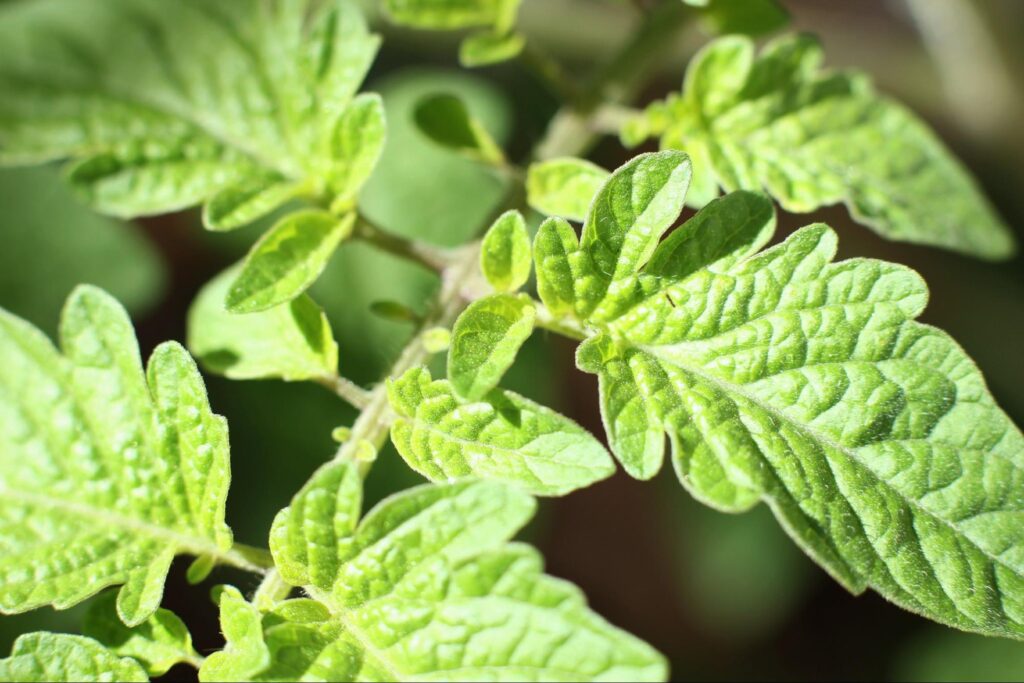
Tomato leaves contain alkaloids that kill aphids and whiteflies
Tomato plants belong to the nightshade family, which contains alkaloids such as “tomatine,” which can effectively control aphids and whiteflies. To prepare tomato leaf juice;
- Take two cups of tomato leaves, chop, and grind them with one cup of water
- Add this paste to one quart of water and let it rest overnight
- Strain the mixture and pour it into a spray bottle
- Apply the mixture on leaf surfaces and near the plant base
Neem Oil Spray to Kill Insects, Fungus, and Mites
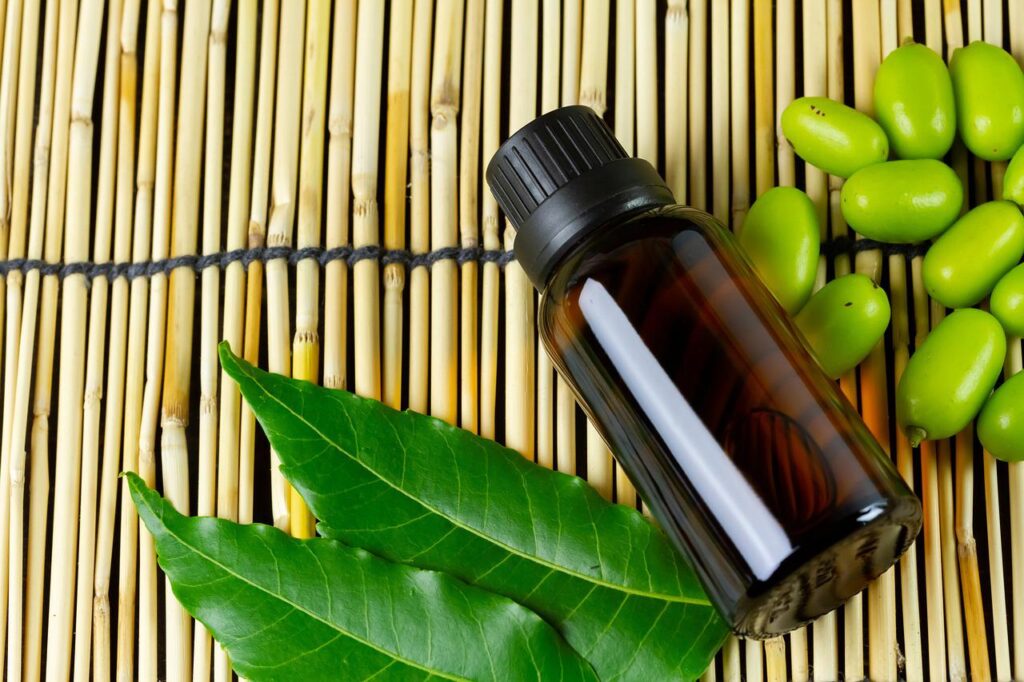
Neem oil spray is the most effective in killing and managing insect populations.
Neem oil is a triple-action pesticide that works like an insect, fungus, and mite killer. It contains azadirachtin, which kills insects in their all life phases (from adults to eggs and in-between stages) by the following mode of action;
- Antifeedant
- By disturbing insect growth regulator hormone
- By impairing their nervous system
To prepare the neem oil spray;
- Take one teaspoon of neem oil and one tablespoon of dish soap and mix both well.
- Add one gallon of water and uniformly mix all ingredients
- Pour the mixture into a spray bottle and apply uniformly on leaf surfaces to kill spider mites and another garden pest
Frequently Asked Questions
Does Lemon Oil Attract Bugs?
The citrus essential oils such as lemon, grapefruit, and sweet orange repel most of the garden pests. Such oils repel fungus gnats, ants, spider mites, silverfish, weevils, and moths.
RELATED: Tiny White Bugs on Plant & How to Identify and Get Rid of Them?
What Smell Do Bugs Hate the Most?
The garden bugs hate the smell of peppermint oil. The regular sprinkling of this oil keeps the pests far away from your plants. It repels the aphids, whiteflies, ants, fruit flies, moths, spiders, fungus gnats, and wasps.
In addition to peppermint oil, lavender oil, cinnamon oil, citronella, lemongrass, tea tree, and spearmint oil repels the garden bugs. These oils also suffocate the insects by blocking the oxygen supply.
How Do You Make Pesticides with Turmeric?
To prepare the turmeric pesticides, we need the following ingredients;
- Two whole garlic heads, separate the cloves, and remove the peel.
- Two tablespoons of turmeric powder
- Twelve cups of water
- Two or three cups of peppermint leaves
- Two tablespoons of cayenne pepper
Put all the ingredients in a blender or food processor and grind them well. Add two more cups of boiling water to it and let it sit overnight.
Now carefully strain the mixture and add one tablespoon of dish soap, and the Tumeric pesticide is ready to kill the pests. Turmeric pesticide is best against soft-bodied insects and common house flies to kill and keep them away.
How Can I Control Pest Naturally?
There are several organic ways to keep the garden bugs away from your indoor plants and vegetables. Natural garden pest methods involve;
- Encourage good garden bugs in your yards, such as lady beetles, parasitic wasps, and green lacewings.
- Rely on cultural control practices such as proper sanitation, pruning, and treatment of cuts with homemade fungicides
- Apply homemade organic sprays such as soap spray and essential oil, and sprinkle diatomaceous earth
- Use physical barriers such as yellow sticky traps to interfere with the life cycle of harmful insects.
What Are the Three Main Methods of Pest Control?
The three main methods of pest control;
- Keep your plants and garden soil healthy because healthy plant soil will attract good garden bugs while repelling the nasty bugs. Also, a healthy plant has a strong defense against insect pests and microbes.
- Remove the source of bug attraction; otherwise, bugs will use it as breeding sites and hiding places.
- Encourage the entry of beneficial insects or good garden bugs and birds to control the populations of insect pests.
- Apply beneficial nematodes such as (Steinernema Carpocapse) in garden soil to kill the flea beetle grubs, caterpillars, and wireworms. These soil-dwelling grubs cause damage to roots and young seedlings and eat the flesh of vegetables.
What Can Farmers Use Instead of Pesticides?
With clear deteriorating impacts of pesticides on our environment, farmers can use crop rotations, handpicking giant insects, mechanical tillage, and weeding. Moreover, farmers can employ biological control agents (fungal, bacterial, and insects) and polycultures (planting multiple crops in the exact locations to distract the harmful pests).
Do Coffee Grounds Repel Ants?
Coffee grounds have significant benefits for plants. It not only fulfills the plant’s nutrition requirements but also protects them from harmful pests such as black ants (these insects guard the aphids and whiteflies for their honeydew).
To discourage the arrival of ants in your garden, sprinkle the coffee grounds over the garden soil. The high nitrogen content will deter ants’ legs, and they will not be able to cross it.
Is Turmeric Harmful to Plants?
No, turmeric is not harmful to plants. However, it has antifungal and antibacterial properties and protects plants from destructive pests.
Sources for Further Reading
- Borden, M. A., Buss, E. A., Brown, S. G. P., & Dale, A. G. (2018, September 26). ENY-350/IN197: Natural Products for Managing Landscape and Garden Pests in Florida. University of Florida. Retrieved May 28, 2022, from https://edis.ifas.ufl.edu/publication/IN197
- Guillebeau, P., & Little, E. (2020). ORGANIC STRATEGIES FOR THE GARDEN AND HOME LANDSCAPE. UGA Extension. Retrieved May 28, 2022, from https://extension.uga.edu/content/dam/extension/programs-and-services/integrated-pest-management/documents/handbooks/2020-pmh-home-chapters/Organic%20Strategies%20for%20the%20Garden%20and%20Home%20Landscape.pdf
- Alternative Pesticide Management for the Lawn and Garden. (n.d.). Colorado State University Extension. Retrieved May 28, 2022, from https://extension.colostate.edu/docs/pubs/garden/xcm221.pdf
Editor’s Recommendations
Fungus Gnats: What Are the Best Management Practices for Them on Houseplants?
Scale Insects: How to Identify and Manage Them for Plant Health?
How to Treat Mealy Bugs on Plant With Organic and Inorganic Methods Effectively?







